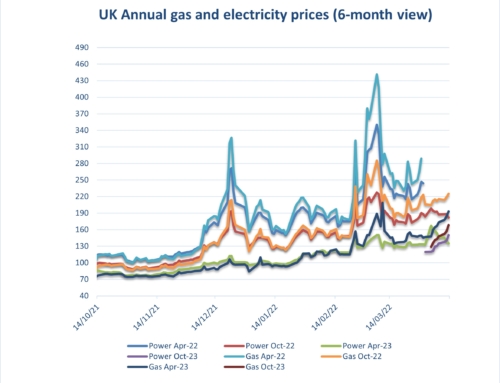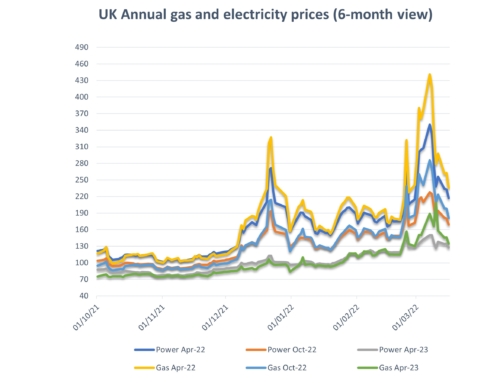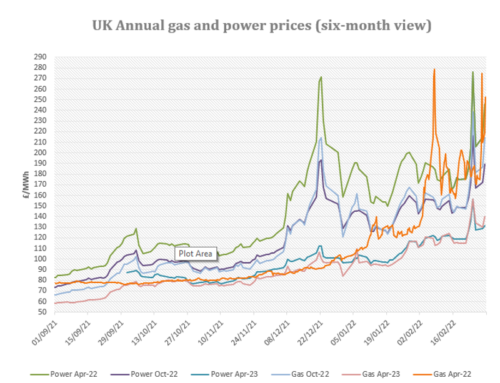Energy costs: Short term power and gas prices have reduced over the last fortnight mainly due to rising temperatures and wind levels and this looks to continue into the beginning of December. Longer term power prices have increase due to further French nuclear outages and longer term gas prices have increased due to the volatility in oil.
Upside:
Power Station Closure – The Aberthaw coal-fired power station in Wales is due to close down within the next fortnight. Due to the closure, there is an increased risk in the event of unplanned generation and grid outages.
Coal/Oil markets – OPEC oil states have announced further supply cuts.
Downside:
Gas storage – This remains significantly high at 97% across Europe with no indication of this diminishing during Winter.
LNG deliveries – We are receiving a large number of LNG deliveries into the country. Qatar is also aiming to increase output by 64% by 2027.
Wind output – Wind generation is expected to remain at average levels over the next couple of weeks.
Temperatures – These are predicted to remain above seasonal norm over the next few days but there is due a cold snap in the middle of December.
Could go either way:
Brexit/Sterling – Until an agreement is reached over Brexit, this will remain an area of significant risk. If the UK crashes out, Sterling devaluation will amplify any increases in fuel markets.
Carbon (CO2) markets – Prices have remained below recent resistance levels since the beginning of the month. However, we did see a big hike in prices at the end of April, when a no-deal Brexit previously seemed imminent.
Russia & Ukraine – Both countries are still to agree a new transit for deliveries of Russian gas into Europe from next year. Further talks are expected over the next few days which could alter the direction of pricing depending on the outcome.
Non-energy costs:
On the electricity side organisations will see further increases in pass through costs from both government and industry infrastructure providers in the coming months as distribution, Electricity Market Reform (EMR),Capacity Market and Energy Intensive Industries (EII) charges are ramped up.
Climate change levy (CCL) increased significantly from April 1st to offset the loss of CRC to Government revenues. Please see the attached pass through charge information for details. Your CCA related CCL exemption rates will increase at the same time (Gas 78%, Electricity 93%). Please ensure your PP11 forms are updated and sent through.
Warning: more gas suppliers are passing through backdated Un-identified Gas (UIG) charges for 2017/18. Please contact us if you have any questions or unusual gas bills.
Is your organisation covered by the new Streamlined Energy and Carbon Reporting (SECR) scheme?
Designed to replace in part the Carbon Reduction Commitment (CRC) which ends this year and to follow on from the energy savings recommendations generated by ESOS compliance. Note, SECR will cover a wider scope of organisations than CRC and ESOS do. Full details are attached below.
SECR will require all large enterprises to disclose within their annual financial filing obligations to Companies House, their greenhouse gas emissions, energy usage (from gas, electricity and transportation as a minimum), energy efficiency actions and progress against at least one intensity ratio.
The scheme came into effect on April 1st, 2019 and will be required to be included in the first set of accounts published for financial years starting after this date.
The scheme covers publicly quoted companies (extending their current disclosure requirements) and UK incorporated companies or LLPs with two or more of the following.
- More than 250 employees
- A turnover in excess of £36 million
- A balance sheet in excess of £18 million.
UK subsidiaries, who meet the eligibility criteria, but are covered by a parent group’s report (unless the parent group is registered outside the UK) and companies using less than 40,000 kWh of energy during the reporting year do not have to provide disclosure. Note the reporting year should be aligned to your financial year.
Are you eligible for an EII rebate?
Under current rules, if you qualify at an industry sector level and your business passes the 20% electricity intensity test you may qualify for exemption to CFD and RO charges. Please see the attached Government RO/CFD guidance document and give me a call to discuss this further.
A copy of our detailed market report is available: Eneco Market Information early December 2019
Gas and electricity prices from 2009 to date are available here: Eneco Gas and Electricity Pricing Trends Sept 2009 to early Dec 2019
A copy of our environmental charges and Climate Change Levy rates from 2012 to date: Environmental Pass Through Charges and CCL ppkWh Updated 05.11.19
A copy of RO/CFD guidance document: RO_CFD_Guidance_Revised_July_2018
SECR: SECR EA Guidelines




